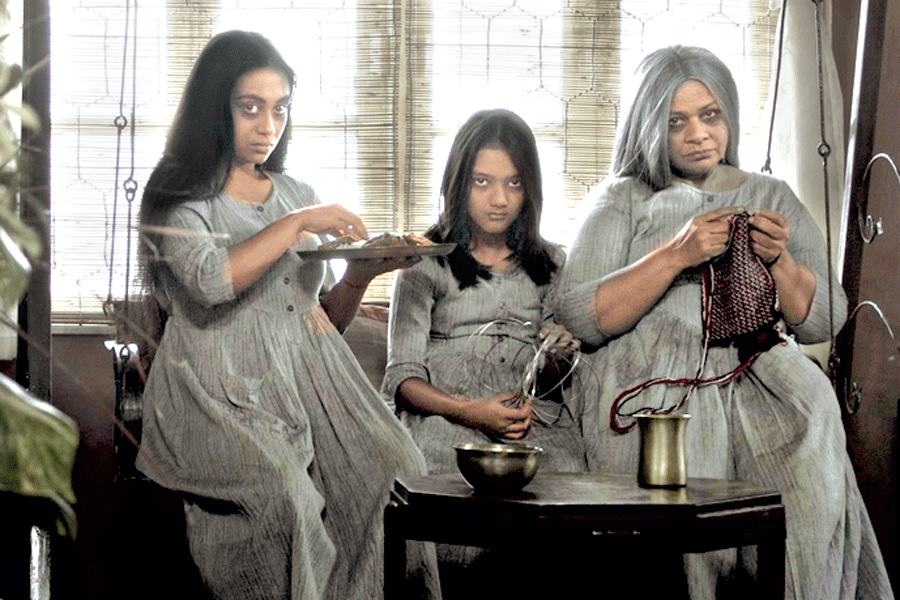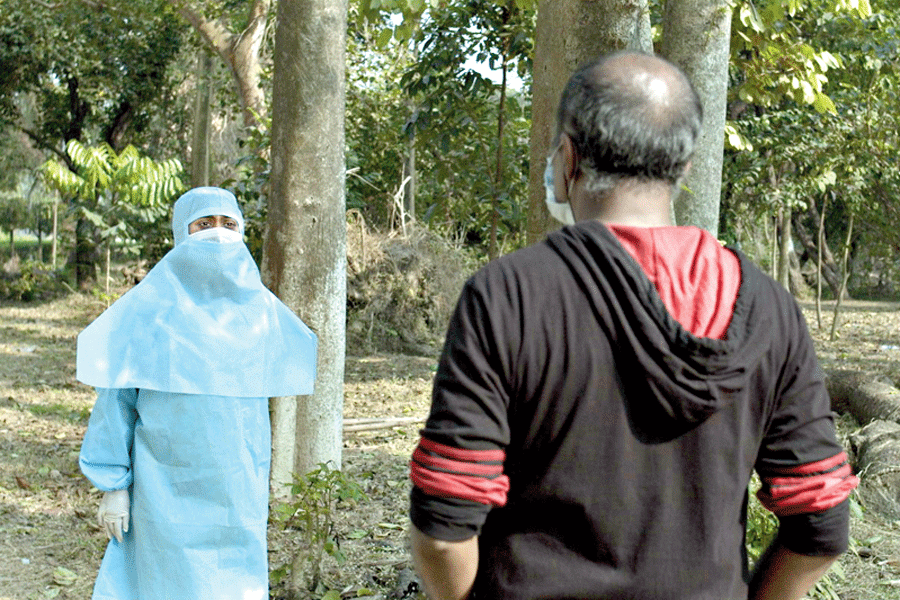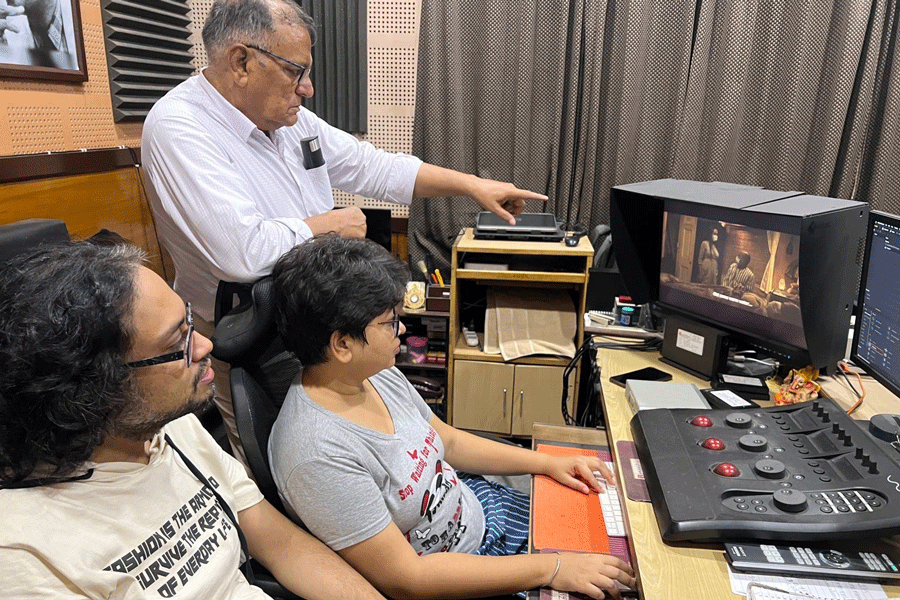A 14-day adventure by a cast and crew of 30, backed by a 75-year-old who refused to be locked down in his Cluster VII home in Purbachal, has reaped a rich harvest. Kalkoksho (House of Time), a two-hour film produced by Anjan Bose of Aurora Film Corporation, has been named the Best Bengali feature film at the 69th National Film Awards.
“The lockdown seemed to be unending. I was feeling claustrophobic at home when these youngsters called me with a script idea. I heard it and gave them the green light. They wrote the story and got the script ready during the lockdown. We were off the block as soon as shooting was allowed, so what if the first wave of Covid had started,” recalled Bose.
The youngsters were the director duo, Rajdeep Paul and Sarmistha Maiti, passouts of the Class of 2010 at Satyajit Ray Film and Television Institute. Bose had approached them on spotting their work, and offered to produce their short films Malai and Kayantar. They had got another National Award earlier, for their first feature-length documentary, At The Crossroads, in 2014.

A still from the film. To the right is HB Block resident Sreelekha Mukherji. The Telegraph
“They were getting ready for their first feature film when Covid struck. They were crest-fallen as there was no way the story they had written could be done in that milieu. I asked them to work on something else. The story of Kalkokkho is what they came up with,” Bose recalls.
The story, says Rajdeep, reflects the desperation that people felt at the time. “The situation was such that it felt one would catch Covid if they put one foot out of the house. There were no Covid beds in hospitals, doctors had stopped attending chamber, the bodies of those who died of Covid were not to be seen,” he said.
Kalkokkho is about a doctor indifferent to his patients who gets kidnapped by a paranoid middle-aged woman who lives in a house with her old forgetful mother and lonely little daughter. The time he spends in the house changes him. “When he tries to escape he finds himself in a time loop. There is magic realism at play in the house,” says Rajdeep.
Playing the eldest generation was Sreelekha Mukherji, who already has a National Award for Best Actress in the cupboard at her HB Block home. “I was the first Bengali actress to get the award after Madhabi Mukherjee (for Dibaratrir Kabya) in 1969. I got it for Parashuramer Kuthar, directed by Nabyendu Chatterjee,” she recalls.

A crucial scene from Kalkokkho which was shot at Banabitan. The Telegraph
Like Bose, Sreelekha was itching to go out and work. “I have taken food to Covid-affected people and even taken care of a patient. I did not get infected despite the exposure. I was confident that staying home in fear would not keep off Covid if it was my lot to get affected. Such a beautiful script with a challenging role came my way after a long time, so there was no way I was going to refuse it.”
But the child who played her granddaughter needed convincing. “Her parents were ready to let her act but she was so scared of Covid that she had not stepped out of the house for months till we finally managed to bring her out,” Bose says.
The producer had rented a house in Mukundapur for 14 days and that is where the shoot took place. “I got them a sack of N95 masks. All possible precautions were taken. Clothes were sprayed with sanitizers from time to time. We all stayed almost quarantined from the rest of our families when we went home at the end of each day,” Bose recalls.
The shoot took place entirely indoors except for two sequences. One show was of migrant labourers getting sprayed with insecticides on them, as was being reported in several states. “We shot that on the field in front of Tata Medical Center, in New Town. The other was the crucial shot of the woman hitting the doctor with a log during his morning walk in Banabitan and kidnapping him,” says Bose.
The film premiered at the Busan International Film Festival in South Korea but no one could travel as the quarantine rules for foreigners were strict after the second wave.
Neither the directors nor the producer had dreamt of a National Award. “There was Prosenjit Chatterjee’s Sesh Pata and Arindam Sil’s Mahananda in contention as well. We were watching the news of the announcement on TV when I thought I heard wrong. The news anchor was naming Kalkokkho!” laughs Bose, who produced a film after a gap of 45 years.
Neither the directors nor the producer had dreamt of a National Award. “There was Prosenjit Chatterjee’s Sesh Pata and Arindam Sil’s Mahananda in contention as well. We were watching the news of the announcement on TV when I thought I heard wrong. The news anchor was naming Kalkokkho!” laughs Bose, who produced a film after a gap of 45 years.
He has got three Rajatkamal awards before (one as director and two as producer-director). “Those were for short films. The recognition for feature film is unparalleled,” he smiles, adding that his father Ajit Bose had got seven as producer of feature films like Bhagini Nibedita (starring Arundhati Debi), Arogya Niketan (starring Bikash Roy) and Raikamal (starring Uttam Kumar and Kaberi Bose).
The invitation to Rashtrapati Bhavan has not yet come but Bose knows he will wear white dhoti-punjabi. For now, he is busy promoting the film anew as riding the National Award wave, Kalkokkho is set for rerelease this Friday. “We have got the 6.30pm slot at Nandan 1, other than 4pm at Radha Studio. Last time, they had given us Nandan 2,” he says.
